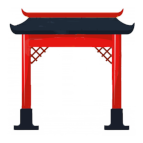| Meaning |

well 井
|
| Explanation |
|
Used in these characters:
|
|
进
|
 |
|
JLPT HSK 2 |
|
| to advance, to enter, to come (or go) into
|
Left: movement 辶, right: a well 井 - (simplified from 進, which showed the forward movement of a bird 隹.) Here: See 井 as railway tracks 丿丨 which are connected by railway sleepers 二
Move along the rails to advance.

|
|
|
|
讲
|
 |
|
JLPT HSK 3 |
|
| to explain, to speak, to negotiate, to emphasize
|
Left: word 讠/言 (sound waves out of a mouth 口), right: a well 井
Use words as profond as a well in an explanation.

|
|
|
|
赛
|
 |
|
JLPT HSK 3 |
|
| competition, match, to surpass, to excel sb.
|
From top: roof 宀, a well 井 and table  (or variant of together: 共), money 贝/貝 (= cone-shell 目 with two feelers 八= shell-money) (or variant of together: 共), money 贝/貝 (= cone-shell 目 with two feelers 八= shell-money)
Under the roof we (fight) together 共 'doubly 二' for money: in a competition.

|
|
|
|
瓶
|
 |
|
JLPT HSK 3 |
|
| bottle, vase, pitcher, jar
|
Left: unite 并 (When you are coming out 丷 of a Buddhist temple 开 you shall be united.) [开 = image of a temple's entrance gate with double upper traverses, which actually means "open", as these gates have no doors], right: roof tile 瓦 (inter-hooked tiles)
(The roof tiles are generalized understood as "pottery") For making sth. 'uniting' (= a container) the pottery is formed into a bottle or pitcher.

|
|
|
|
寒
|
 |
|
JLPT HSK 4 |
|
| cold, poor, to tremble
|
From top: a roof 宀, a well 井, variant of six 六, variant of ice 冫
Under the roof, the well has six pieces of ice: It's cold!

|
|
|
|
井
|
 |
|
JLPT HSK 6 |
|
| a well, neat, orderly
|
Pictograph of a framed well

|
|
|
|
耕
|
 |
|
JLPT HSK 6 |
|
| to plow, to till
|
Left: 耒 (tree 木 with many branches), right: a well 井 (here: image of crossing plow lines)
For the plant to get many branches you need to plow.

|
|
|
|
塞
|
 |
|
JLPT HSK 6 |
|
| to block, to stuff, to squeeze in, obstruct, Serbian
sāi, sài, sè
宀
井
六
土
 |
|
From top: roof 宀, a well 井, var. of six 六, earth 土
Despite the roof, the well was already six-times filled with earth and thus blocked/obstructed.

|
|
|
|
阱
|
 |
|
JLPT HSK 6 |
|
| hole, pitfall
|
Left: hill 阝, right: a well 井
At the hill is a 'well', that actually is a pitfall.

|
|
|
|
寨
|
 |
|
JLPT no HSK |
|
| stronghold, stockade, camp, village
|
From top: roof 宀, a well 井, table  , tree 木 , tree 木
For (protecting) our roofs and wells, we use tables and trees to (build) a: stronghold.

|
|
|
| Radicals are shown here that are similar either in appearance or meaning. |  |
|
At the page you get the memory phrases for learning the Chinese Hanzi. If you are learning the Japanese kanji, please follow this link. |
List of the characters |
List of the radicals
|

